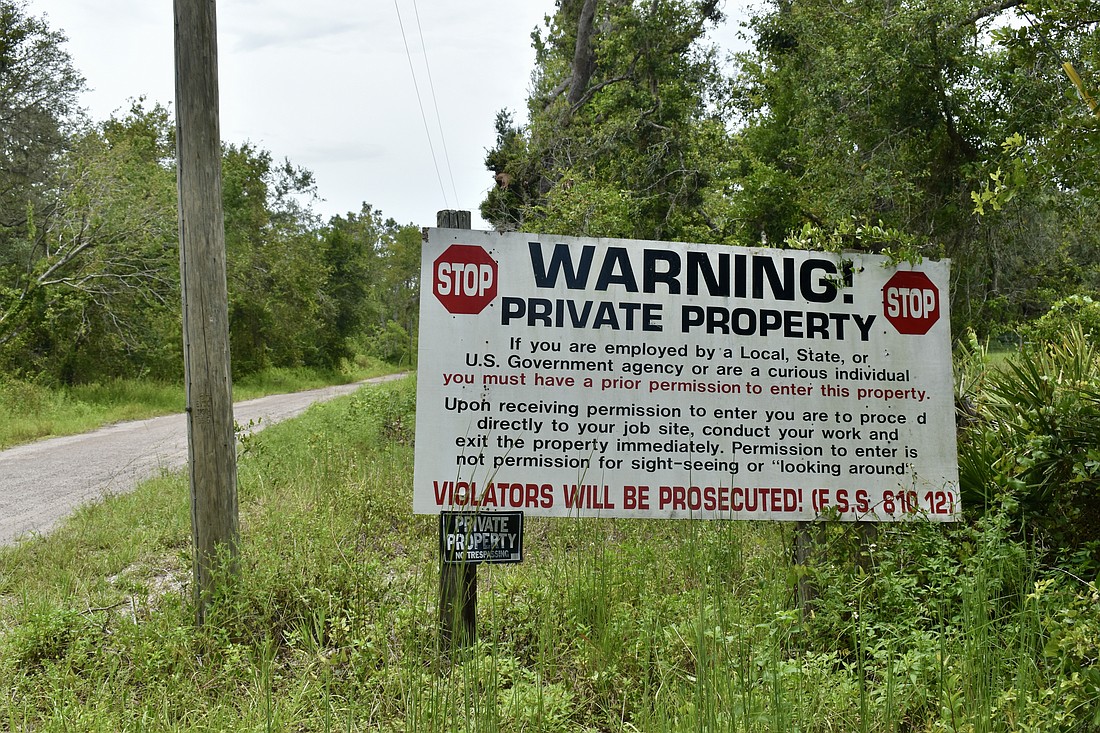- May 15, 2025
-
-
Loading

Loading

Code violators in Manatee County have racked up $26,330,786.95 worth of outstanding fines and liens.
Commissioner George Kruse noted during the commission’s latest work session July 20, “That’s not 26,000 old ladies with $1,000 worth of fines.”
Division Chief of Code Enforcement George McCorkle confirmed that the Top 20 offenders all have fines of over $500,000, five of which have accrued fines of more than $1 million.
“These are residential lots who have constructed something without a permit and have refused to apply for the permit or come into compliance, and the fines are accruing daily,” McCorkle said.
At least that is many of the offenders. Some just have created a public nuisance.
William Pugh owns an 18-acre property at 5807 Hog Town Lane in Myakka City that has been in violation of county codes since March 2010 “for storing/or dismantling vehicles and materials on the property that do not have a primary use.”
According to the Manatee County Property Appraiser’s records, the parcel’s value skyrocketed from $194,000 in 2022 to $459,000 in 2023. But Pugh can’t currently cash in on that spike, even if he wanted to, because the county has a $1,408,500 lien on the property.
“Failure to comply with this order within the specified time will result in the recordation of this Order Imposing Fine, which constitutes a lien upon any real or personal property owned by the violators and may be foreclosed, and your property sold to enforce this lien,” Pugh’s order read. “If such lien is filed, you will be assessed all costs incurred in recording and satisfying this lien.”
For the average homeowner, foreclosure is never the route the county wants to take, but McCorkle made a request to hire outside legal counsel to go after the big ones like Pugh.
Code enforcement sees about a 75% compliance rate, but that other 25% keeps their hands tied thanks to Florida Statute 162, which governs the department. The statute limits foreclosures and fines and says code enforcement staff cannot trespass on property or force compliance.
If a property is vacant, county staff can board up windows and mow to bring the property back into compliance themselves, but that’s not an option when occupied.
For the 25% who refuse to comply, they don’t have to unless the violation involves criminal activity. If people are living illegally in a vacant house, McCorkle can call law enforcement to rectify the issue. If a person built a shed without a permit and doesn’t want to comply, McCorkle has an arduous road of paperwork ahead.
First, code enforcement sends a courtesy notice via certified mail. Pugh’s was dated March 17, 2010. The notice stated he had until March 31 to come into compliance or he would be sent before the Manatee County Code Enforcement Board or Special Magistrate.
That was in 2010. Currently, residents have 30 days to comply. They can also be asked to appear before a judge, but the judge can’t impose a fine of more than $500.
“It’s always voluntary compliance. At the end of the day, that’s what we want to see,” McCorkle said. “There’s no compliance order, it’s simply a punitive process.”
Pugh was ordered to appear before a code enforcement special magistrate on July 28 but didn’t show. He supplied a four-page written response instead, in which he claimed the case was settled in 1992 and was reopened due to discrimination from the local sheriff and a spiteful neighbor who reported him after no longer allowing the neighbor’s cows to graze on his land.
An Order Imposing Fine was issued. Pugh was ordered to pay a $150 fine and given until Sept. 17 to comply. When he didn’t, he started accruing an additional $100 a day in penalties.
The county attorneys, code enforcement and commissioners agreed that they only want compliance in this case and any other. They’ll work with citizens to lower the fees, and they take hardships into consideration.
But Pugh is an example of the bind code enforcement is in when someone just flat out refuses. Pugh is a 94-year-old man, who remains adamant that he bought that lot because the realtor told him he could store his cars on it. Instead of complying, he posted a large and explicit No Trespass sign on the road leading to his property.
“If you are employed by a Local, State, or U.S.Government agency or are a curious individual you must have a prior permission to enter this property,” the sign reads. “Upon receiving permission to enter you are to proceed directly to your job site, conduct your work and exit the property immediately. Permission to enter is not permission for sight-seeing or "looking around.” Violators will be prosecuted (ESS.81012).”
Manatee County commissioners have requested a review of the highest penalty cases. No action has been taken as of yet.